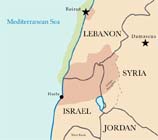European Parliament torn over Lebanon crisis
 Brussels - The European Union should act urgently to help bring about a peaceful resolution to Lebanon's ongoing political crisis, members of the European Parliament (MEPs) said Wednesday.
Brussels - The European Union should act urgently to help bring about a peaceful resolution to Lebanon's ongoing political crisis, members of the European Parliament (MEPs) said Wednesday.
But the MEPs found no agreement on how the EU could best intervene in a region where the interests of Syria, Iran, Israel and the US all play a part.
"Violence could break out at any moment ... with unforeseeable consequences for the country and its people," EU Enlargement Commissioner Olli Rehn warned MEPs as the debate opened.
The commission's key priority in the near future will be to support Arab League efforts to resolve the long-running crisis, since this "represents the only option to find a solution," Rehn said.
Lebanon has been in political turmoil since former president Emile Lahoud stepped down at the end of his term on November 28, and parliament failed to agree on his replacement.
Over a dozen subsequent parliamentary sessions have failed to end the stalemate between pro- and anti-Syrian factions, and many MEPs highlighted the key role played by Damascus in the crisis.
"Lebanon cannot be governed from Damascus, but it cannot be governed against Damascus either," conservative MEP Jose Ignacio Salafranca pointed out.
"We have to bear Damascus and other capitals in mind, but we have to focus on the confrontation between new forces in Lebanon, expressed by the systematic assassination of adversaries," liberal MEP Marco Pannella said.
Several MEPs also pointed to the pivotal role played by Hezbollah, with Polish right-wing MEP Konrad Szymanski urging the EU to add the group to its blacklist of terror organizations.
But most stressed the fact that the only viable way out of the impasse would be for Lebanon's politicians to find their own compromise, with the EU playing a supporting role.
That appreciation of the limited role which the EU can realistically play in the situation was not to the taste of all.
"Europe could play a more significant role, but it sits on the fence and doesn't come off," British conservative John Purvis said, calling for a "stronger line" to replace the "impotence" of current EU and Arab League policies.(dpa)